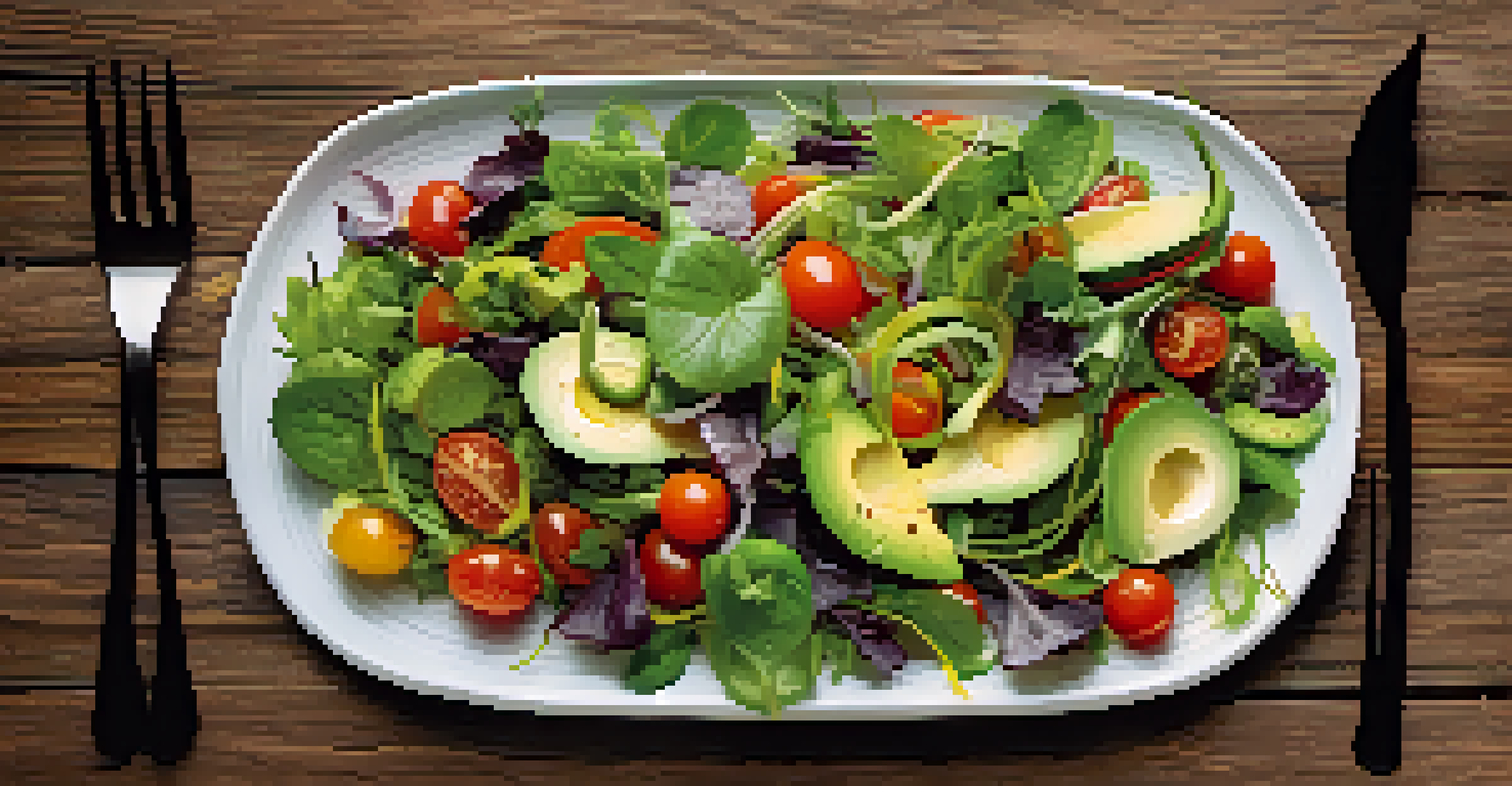Healthy Habits: Building a Sustainable Nutrition Plan

Understanding Sustainable Nutrition and Its Importance
Sustainable nutrition focuses on eating in a way that benefits both your health and the planet. It encourages choosing foods that are environmentally friendly while meeting your nutritional needs. This approach not only supports your well-being but also helps reduce the carbon footprint associated with food production.
You are what you eat, so don’t be fast, cheap, easy, or fake.
By adopting sustainable nutrition, you can contribute to a healthier ecosystem. For example, selecting local, seasonal produce not only tastes better but also supports local farmers and reduces transportation emissions. This connection between food choices and environmental impact is crucial for fostering a sustainable future.
Ultimately, sustainable nutrition is about making informed choices that align with your values. It’s a lifestyle that promotes balance and mindfulness in eating, making it easier to stay committed to your health goals over time.
Assessing Your Current Eating Habits
To build a sustainable nutrition plan, start with a thorough assessment of your current eating habits. Take note of what you typically consume in a week, including meals, snacks, and beverages. This awareness can help you identify patterns, such as reliance on processed foods or a lack of variety in your diet.

Consider keeping a food diary for a week to track your intake. This simple practice can reveal surprising insights about your eating habits, such as emotional eating triggers or portions that might be larger than necessary. Understanding these aspects is the first step toward making positive changes.
Embrace Sustainable Nutrition
Sustainable nutrition promotes eating habits that benefit both personal health and the environment.
Once you have a clear picture of your habits, you can pinpoint areas for improvement. Whether it's increasing your vegetable intake or reducing sugary snacks, knowing where to focus your efforts will make the journey toward healthier eating much more manageable.
Setting Realistic and Achievable Nutrition Goals
Goal setting is a crucial component of building a sustainable nutrition plan. Start by defining specific, measurable, achievable, relevant, and time-bound (SMART) goals. For example, instead of saying, 'I want to eat healthier,' aim for 'I will include two servings of vegetables in each meal for the next month.'
Eating is an agricultural act.
Breaking down larger goals into smaller, more manageable steps can help maintain motivation. If your ultimate goal is to prepare more meals at home, begin by planning just one home-cooked meal per week. Gradually increase this as you become more comfortable in the kitchen.
Remember, the key to achieving your nutrition goals is consistency, not perfection. Celebrate small victories along the way, and don’t be too hard on yourself if you have setbacks. Each step forward, no matter how small, brings you closer to a balanced and sustainable nutrition plan.
Incorporating Variety into Your Diet
Variety is the spice of life, especially when it comes to nutrition. A diverse diet ensures you get a broad spectrum of nutrients, which is vital for overall health. Aim to include a rainbow of fruits and vegetables in your meals, as different colors often signify different beneficial compounds.
Experimenting with new foods can also keep your meals exciting. Try replacing your usual grains with quinoa or farro, or introduce a new type of fruit each week. This not only enhances your culinary skills but also makes healthy eating more enjoyable.
Set Achievable Nutrition Goals
Establishing specific, measurable goals can lead to lasting changes in your eating habits.
Incorporating variety can also help prevent boredom, making it easier to stick to your healthy eating habits. Instead of viewing dietary changes as restrictive, think of them as an opportunity to explore new flavors and cuisines, keeping you motivated on your health journey.
Prioritizing Whole Foods Over Processed Options
One of the cornerstones of a sustainable nutrition plan is prioritizing whole foods. Whole foods, such as fruits, vegetables, whole grains, and lean proteins, are minimally processed and packed with essential nutrients. These foods provide your body with the fuel it needs to function at its best.
In contrast, processed foods often contain unhealthy additives, excess sugar, and unhealthy fats. By reducing your intake of these items, you can improve your overall health and well-being. An easy way to identify whole foods is to shop the perimeter of the grocery store, where fresh produce, meats, and dairy are typically located.
Making small changes, like swapping out sugary snacks for fresh fruit or choosing brown rice over white, can have a significant impact on your health. Over time, these choices contribute to a more balanced diet and help you develop a sustainable approach to eating.
Mindful Eating: Connecting with Your Food
Mindful eating is all about being present and engaged during meals. It encourages you to pay attention to the flavors, textures, and aromas of your food, as well as your body's hunger and fullness cues. This practice can lead to a more satisfying eating experience and help prevent overeating.
Taking the time to savor each bite can transform your meals from a rushed routine into a mindful ritual. Try putting away distractions like phones or TV while you eat, allowing you to fully appreciate the nourishment you're providing your body.
Practice Mindful Eating
Being present during meals enhances your eating experience and helps make healthier food choices.
Incorporating mindfulness into your eating habits can also help you make better food choices. When you connect with your food, you're more likely to choose options that nourish and sustain you, rather than those that simply fill a void.
Staying Consistent: Overcoming Challenges and Setbacks
Building a sustainable nutrition plan is a journey that comes with its own set of challenges. Life can get busy, and it's easy to fall back into old habits. Acknowledging that setbacks are a natural part of the process can help you stay resilient and focused on your goals.
Developing a support system can make a significant difference in maintaining your healthy habits. Share your goals with friends or family, join a community group, or seek out support online. Having others on the same journey can provide motivation and accountability when times get tough.

Remember, consistency doesn’t mean perfection. If you have a day where you stray from your plan, don't be too hard on yourself. Instead, reflect on what led to the change and use it as a learning opportunity to strengthen your resolve moving forward.